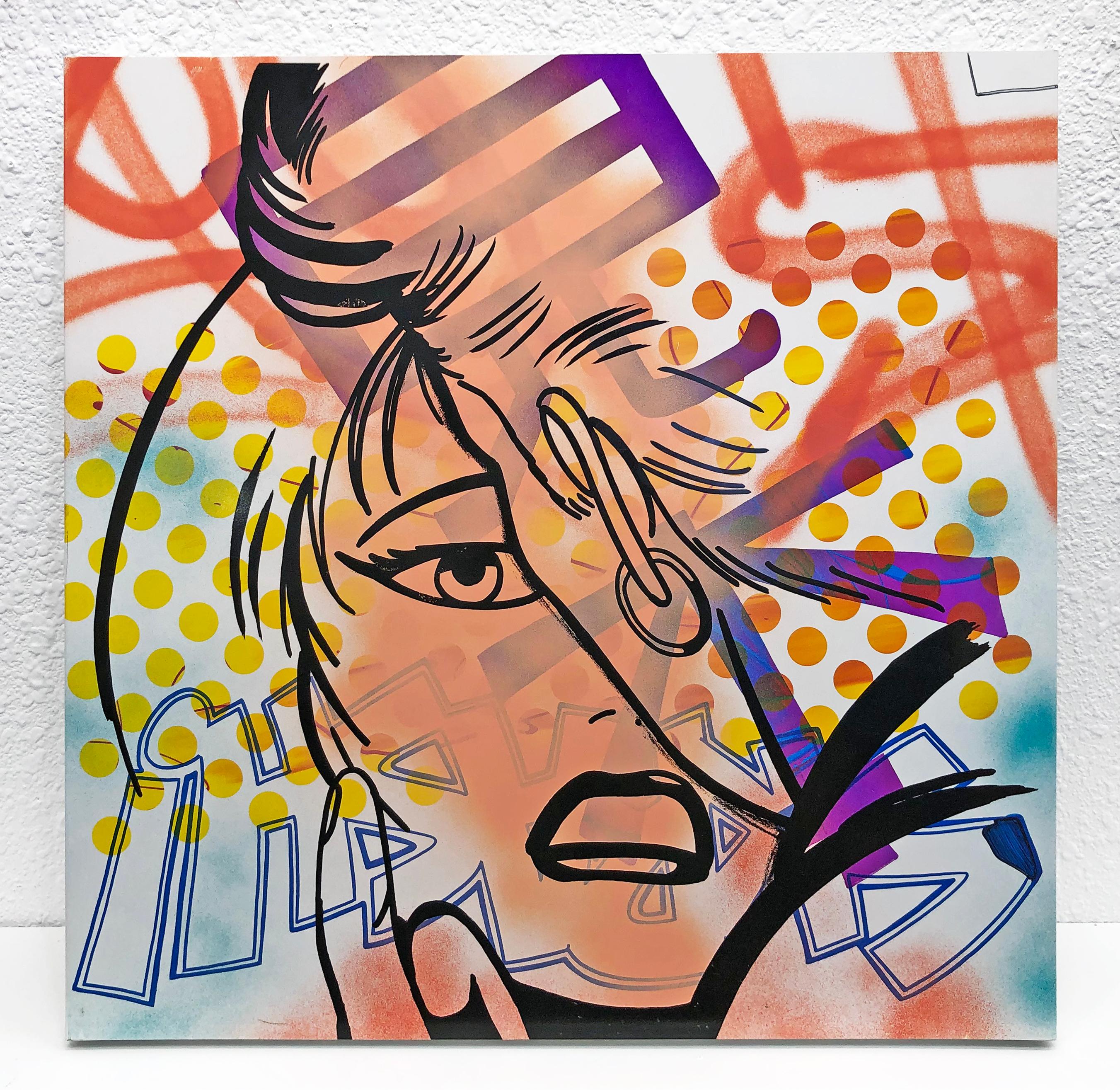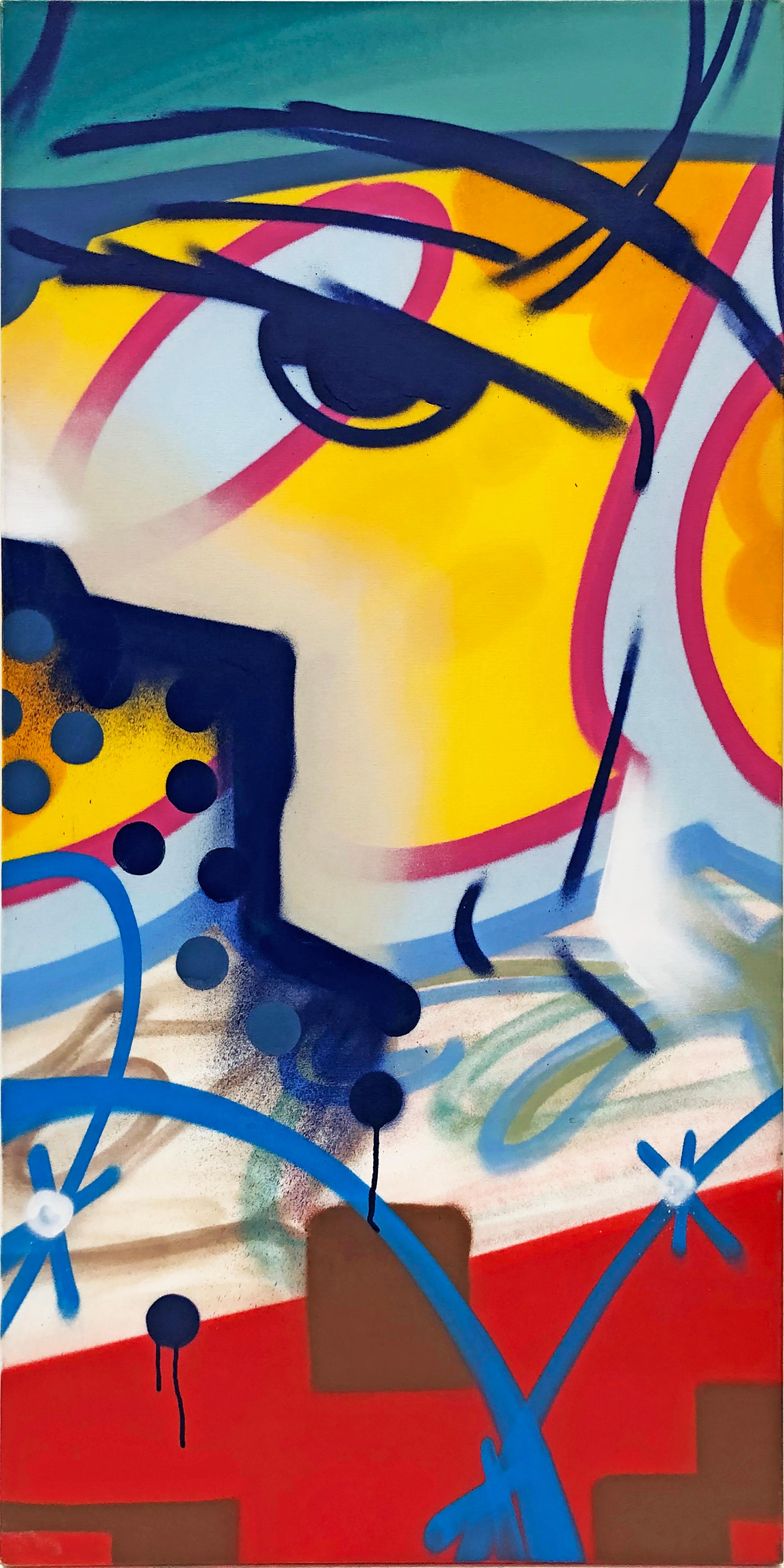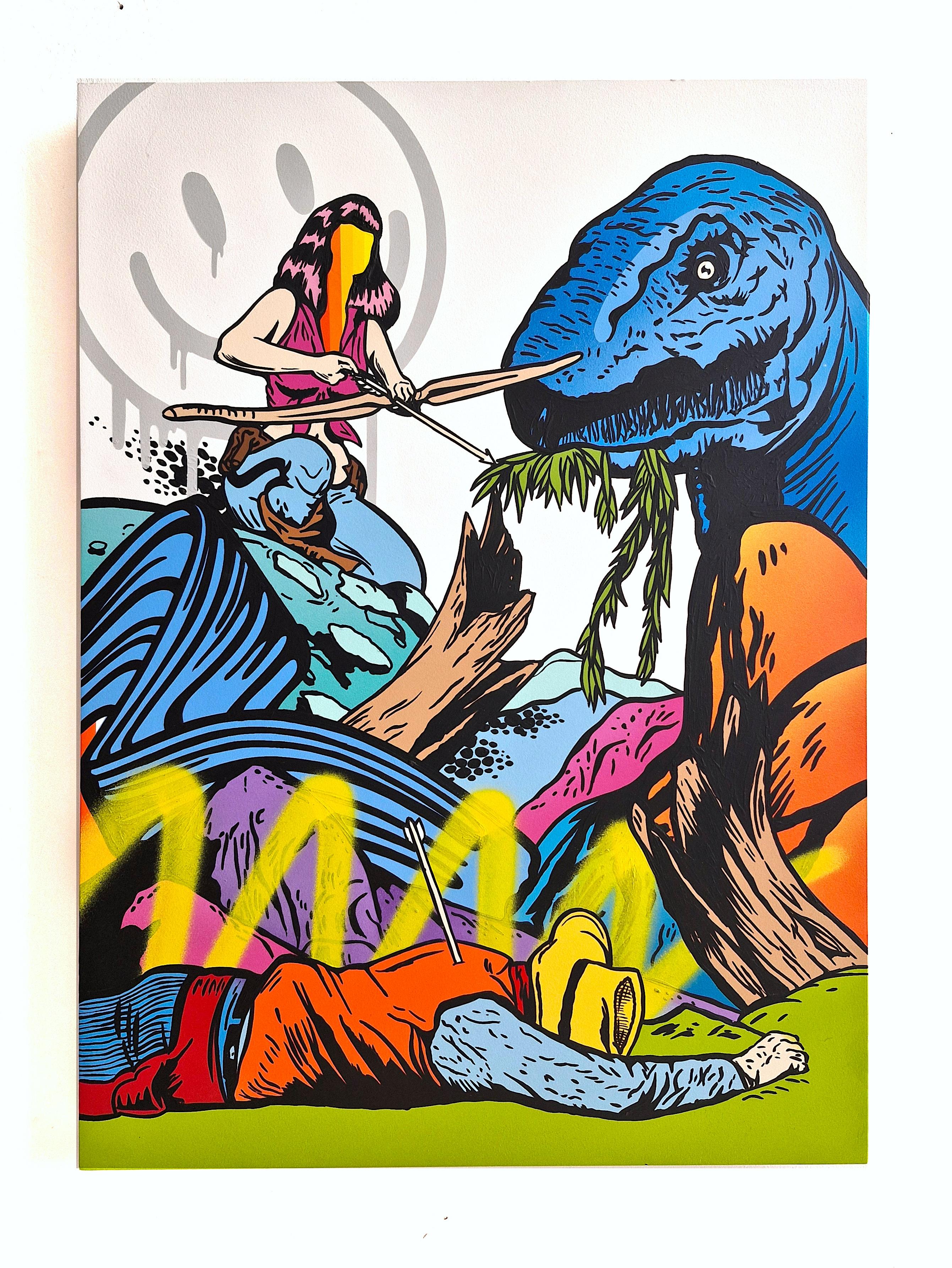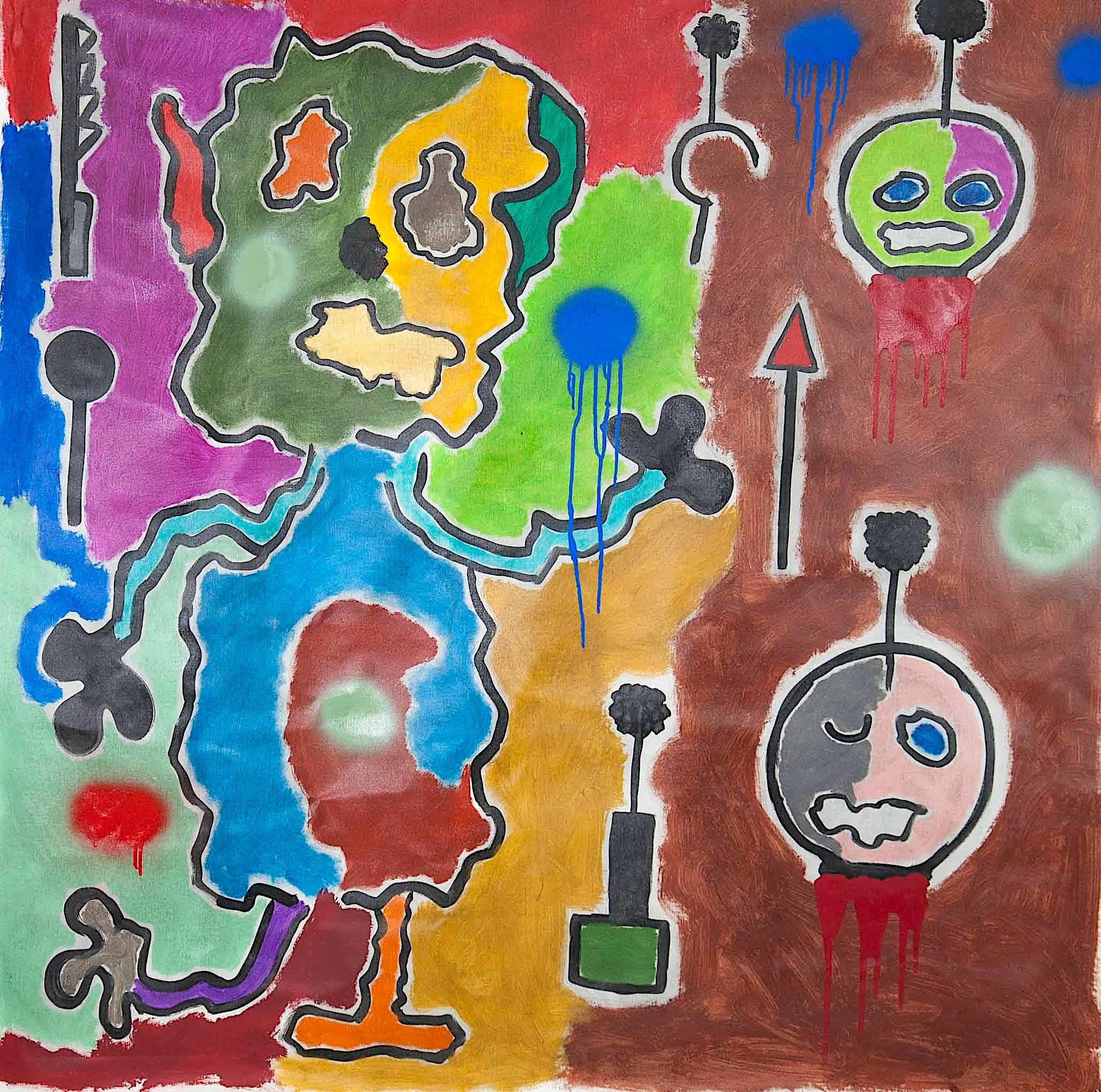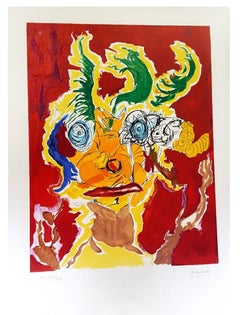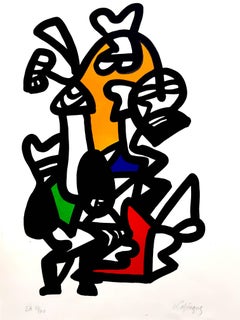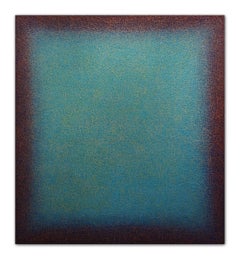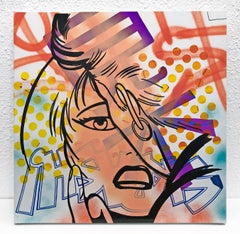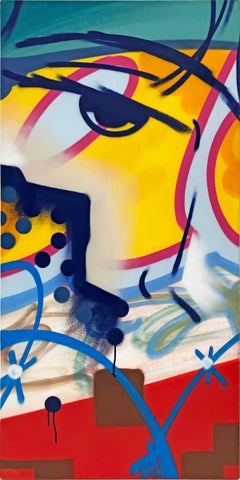Items Similar to M.Chat - Untitled - Street Art Signed Painting
Want more images or videos?
Request additional images or videos from the seller
1 of 5
M. ChatM.Chat - Untitled - Street Art Signed Painting
$9,025.10
£6,681.76
€7,500
CA$12,495.88
A$13,642.51
CHF 7,152.21
MX$165,693.58
NOK 89,319.48
SEK 84,341.40
DKK 57,099.10
About the Item
M. CHAT
Untitled
Painting mounted on canvas
Signed
Dimensions : 120 x 120 cm including frame
Framed painting
Avec certificat
Discreet and unobtrusive, Monsieur Chat or M. Chat has been working on the streets since he was 15. His anonymity was broken in 2007 when he was caught painting his famous symbol – the cat. The man behind the mask was revealed to be Thoma Vuille, but he didn’t allow himself to be disturbed by this. Instead, he continued to exacerbate the already crystallized curiosity around the urban graphics of his increasingly present symbol. The shadow of his anonymous existence dispersed upon being shined on, but in the end, he realized that he and his alter ego are one and the same person, so he learned to drop the mask and raise his name alongside the signature of his alter ego. Believing in the idea and repeating it continuously over time, the artist got to the point where he was able to shape those around him in a way that, ultimately, the image he projects outwards is reflected back at him at times when he starts to entertain his own doubts about it.
Throughout the World
Born in Boudry, in the canton of Neuchâtel, Switzerland, Chat began roaming the streets around 1987. He studied at the Institute of visual Arts of Orléans, graduating in 2001. In 1997, during one of the workshops, the grinning cat was born. In his, now omnipresent symbol, the culture of the neighborhood meets the never-ending optimism of the artist, making a combination that is easily recognizable and widely famous. His dream of uniting human beings, different as they might be, is now possible. That single unifying subject has been found, and he’s ever since on a mission of spreading that subject throughout the world. It was this kind of contagious optimism that nudged the film-maker Chris Marker into approaching the artist, and eventually making a documentary about him in 2004. Reflecting on France’s state after the 9/11, Marker used the phenomenon of the Chat’s cat to explore the sad feelings of the people, but to share some optimism as well. The attention was not focused on the artist, for once, as we do not need to know his personal history to be able to feel something upon seeing his work. In fact, the state of mind, or an attitude, or a philosophical aspiration, is represented through an image. Behind that image lies all the simplicity of a smile painted on a wall, and all the power that comes with it. Vuille keeps the drawing simple and the line clear. On the first sight, the cat looks like a logo. However, it can’t be reduced to a logo, as it’s so much more than that. Belonging to street art, it’s a character with a strong identity and many variations. A character that achieves a symbolic dimension through its simplicity.
A Dispute with RATP – Let Art Be Free
Street art is highly unpredictable – where one sees inspirational pieces, others see the destruction of property. The artist had been previously arrested on brush in hand by the Police Municipal of Orléans in 2007. The Régie autonome des transports Parisian demanded 1,800 euros in damages, stating that Vuille had, without prior authorization, drawn inscriptions, signs or drawings, in the case of Cat Heads on the walls of the Châtelet-Les Halles station during its renovation in May 2014. Due to some contradictories, Vuille’s lawyer raised the invalidity of the notice of the artist, stating that he and his client were not completely sure what they were accused of. The court found the nullity of the summons, and the RATP finally asked one euro in damages, an amount incomparable to their previous requests. The whole thing turned out to be nothing more than a bad memory for Monsieur Chat, stating that he was not a criminal, but an artist. He also explained that his intention was to humanize a transit corridor, which was gray. All he did was putting some color on it, sharing happy feelings with all who passed nearby.
Discreet and unobtrusive, Monsieur Chat or M. Chat has been working on the streets since he was 15. His anonymity was broken in 2007 when he was caught painting his famous symbol – the cat. The man behind the mask was revealed to be Thoma Vuille, but he didn’t allow himself to be disturbed by this. Instead, he continued to exacerbate the already crystallized curiosity around the urban graphics of his increasingly present symbol. The shadow of his anonymous existence dispersed upon being shined on, but in the end, he realized that he and his alter ego are one and the same person, so he learned to drop the mask and raise his name alongside the signature of his alter ego. Believing in the idea and repeating it continuously over time, the artist got to the point where he was able to shape those around him in a way that, ultimately, the image he projects outwards is reflected back at him at times when he starts to entertain his own doubts about it.
city english cookies video
Monsieur Chat – Siesta à Paris, 2016 (Left) / Sky With Dufy, 2016 (Right), image courtesy of Galerie Brugier-Rigail
Throughout the World
Born in Boudry, in the canton of Neuchâtel, Switzerland, Chat began roaming the streets around 1987. He studied at the Institute of visual Arts of Orléans, graduating in 2001. In 1997, during one of the workshops, the grinning cat was born. In his, now omnipresent symbol, the culture of the neighborhood meets the never-ending optimism of the artist, making a combination that is easily recognizable and widely famous. His dream of uniting human beings, different as they might be, is now possible. That single unifying subject has been found, and he’s ever since on a mission of spreading that subject throughout the world. It was this kind of contagious optimism that nudged the film-maker Chris Marker into approaching the artist, and eventually making a documentary about him in 2004. Reflecting on France’s state after the 9/11, Marker used the phenomenon of the Chat’s cat to explore the sad feelings of the people, but to share some optimism as well. The attention was not focused on the artist, for once, as we do not need to know his personal history to be able to feel something upon seeing his work. In fact, the state of mind, or an attitude, or a philosophical aspiration, is represented through an image. Behind that image lies all the simplicity of a smile painted on a wall, and all the power that comes with it. Vuille keeps the drawing simple and the line clear. On the first sight, the cat looks like a logo. However, it can’t be reduced to a logo, as it’s so much more than that. Belonging to street art, it’s a character with a strong identity and many variations. A character that achieves a symbolic dimension through its simplicity.
The simplicity of the smile painted on a wall represents the state of mind
page france french
Monsieur Chat – Le Masque de Mme Chat (Left) / Tutti Frutti (Right)
A Dispute with RATP – Let Art Be Free
Street art is highly unpredictable – where one sees inspirational pieces, others see the destruction of property. The artist had been previously arrested on brush in hand by the Police Municipal of Orléans in 2007. The Régie autonome des transports Parisian demanded 1,800 euros in damages, stating that Vuille had, without prior authorization, drawn inscriptions, signs or drawings, in the case of Cat Heads on the walls of the Châtelet-Les Halles station during its renovation in May 2014. Due to some contradictories, Vuille’s lawyer raised the invalidity of the notice of the artist, stating that he and his client were not completely sure what they were accused of. The court found the nullity of the summons, and the RATP finally asked one euro in damages, an amount incomparable to their previous requests. The whole thing turned out to be nothing more than a bad memory for Monsieur Chat, stating that he was not a criminal, but an artist. He also explained that his intention was to humanize a transit corridor, which was gray. All he did was putting some color on it, sharing happy feelings with all who passed nearby.
In March on 2016, he created a mural in Hong Kong, China – it’s one his biggest so far
Vuille shows no signs of slowing down. In March of 2016, he came in Hong Kong, China to paint a mural on the Hotel Jen on Queen’s Road West. The piece is 13×13 meters and is one his biggest so far. As always, he intended to bring humor and humanity to Hong Kong with his creations. Once anonymous, Monsieur Chat was forced to reveal his identity in 2007, when he was arrested. Since then, he has come to embrace his public profile without expressing any regrets for his past actions. Looking forward instead of backward, he takes his responsibilities seriously. Being unmasked opened new doors for him, and he didn’t lose any of his energy that was originally behind the creation of the iconic Smiling Cat.
- Creator:M. Chat (French)
- Dimensions:Height: 39.38 in (100 cm)Width: 39.38 in (100 cm)Depth: 0.4 in (1 cm)
- Medium:
- Movement & Style:
- Period:
- Condition:
- Gallery Location:Collonge Bellerive, Geneve, CH
- Reference Number:1stDibs: LU16122046023
About the Seller
4.9
Platinum Seller
Premium sellers with a 4.7+ rating and 24-hour response times
Established in 2015
1stDibs seller since 2015
965 sales on 1stDibs
Typical response time: 1 hour
- ShippingRetrieving quote...Shipping from: Collonge Bellerive, Geneve, Switzerland
- Return Policy
Authenticity Guarantee
In the unlikely event there’s an issue with an item’s authenticity, contact us within 1 year for a full refund. DetailsMoney-Back Guarantee
If your item is not as described, is damaged in transit, or does not arrive, contact us within 7 days for a full refund. Details24-Hour Cancellation
You have a 24-hour grace period in which to reconsider your purchase, with no questions asked.Vetted Professional Sellers
Our world-class sellers must adhere to strict standards for service and quality, maintaining the integrity of our listings.Price-Match Guarantee
If you find that a seller listed the same item for a lower price elsewhere, we’ll match it.Trusted Global Delivery
Our best-in-class carrier network provides specialized shipping options worldwide, including custom delivery.More From This Seller
View AllArmand Nakache - Original Handsigned Lithograph - Ecole de Paris
By Armand Nakache
Located in Collonge Bellerive, Geneve, CH
Armand Nakache
Original Handsigned Lithograph
Dimensions: 76 x 54 cm
Edition: HC XXI/XXX
HandSigned and Numbered
Ecole de Paris au seuil de la mutation des Arts
Sentiers Editions
...
Category
1960s Expressionist Portrait Prints
Materials
Lithograph
Michel Tyszblat - Jazz' Spirit
By Michel Tyszblat
Located in Collonge Bellerive, Geneve, CH
Michel Tyszblat
100 x 120 cm
Oil on panel
Signed
Michel Tyszblat was born in Paris in 1936. His family originally came from Poland.
He studied under André Lhote in 1956 and...
Category
20th Century Abstract Expressionist Abstract Paintings
Materials
Oil
Charles Lapicque - Original Handsigned Lithograph - Ecole de Paris
By Charles Lapicque
Located in Collonge Bellerive, Geneve, CH
Charles Lapicque
Original Handsigned Lithograph
Dimensions: 56 x 38 cm
Edition: EA 14/20
Hand Signed and Numbered
Charles Lapicque was one of the great painters of the “Ecole de Paris...
Category
1960s Abstract Expressionist Landscape Prints
Materials
Lithograph
Eberhard Ross - Speicher - Original Painting
By Eberhard Ross
Located in Collonge Bellerive, Geneve, CH
Eberhard Ross - Speicher - Original Painting
Dimensions: 120 x 110 cm
Medium: Oil on Canvas
Eberhard Ross
Born 1959 in Krefeld Germany
Studied at Folkwang-University Of Arts Essen...
Category
2010s Contemporary Mixed Media
Materials
Oil, Canvas
Bengt Lindstrom - Original Handsigned Engraving
By Bengt Lindström
Located in Collonge Bellerive, Geneve, CH
Bengt Lindström - Original Handsigned Engraving
The Seven Deadly Sins.
76 x 56 cm
Signed in pencil by Bengt Lindström
Paris, ABCD, 1976.
Original etching in color
Limited edition 90 ex.
This is the unique copy offered to Claude Manesse,
The story of B. Lindström was collected by Frederick Towarnicki, assisted by Agathe Malet-Buisson. The engravings were drawn on the presses of Claude Manesse.
Bengt Lindström (1925-2008)
Bengt Lindström was born on September 3rd, 1925 in Storsjökapell, a small isolated village in the Swedish province of Norrland. The young child thus grew up in that vast, mythical and harsh expanse of mounts, glistening lakes and endless forests known as Lapland. His father was a primary school teacher who was fond of Lapps and who showed great interest in their ethnic group and culture. The child was only three days old when Lapp King Kroik, his godfather, administered the Baptism of the Earth, where the child is conveyed between two roots of a tree to grant him protection from the Gods. Lapps as well as local lumberjacks would occasionally abandon their silent ways to tell him and reveal the tales, legends and mysteries of the Great White North.
1935-1945 : He left Storsjökapell and headed to Härnösand, where he wrote short science-fiction novellas, became a renowned athlete and began to paint.
1944-1946 : Isaac Grünewald Art School in Stockholm, Sweden. Study drawing with Aksel Jörgensen at the Copenhagen Fine Arts School in Denmark. He realized his first two lithographs, Meditation and Le Modèle Etendu (The Stretched Model).
1947-1952 : He arrived in Paris. He travelled to Italy, where he visited Florence and Assisi, developing a deep fascination for Giotto and Cimabue. He was granted a scholarship by Swedish magazine Aftontidningen, which helped him move into a workshop in Arcueil, France. He began working on mosaics.
1953-1967 : He returned to Paris, once again taking up lithography and engraving, which holds a vital position in his work. He moved into a workshop in Rueil-Malmaison. This was the start of his collaboration with the Rive Gauche Gallery in Paris. London Tooth & Sons Gallery Director M. Cochrane purchased a large number of his works. He left the workshop in Rueil-Malmaison to settle in Savigny-sur-Orge, France. He began taking to figurative art with Masks, Gods and Monsters. He exhibited with the Nouvelle Figuration Group at the Mathias Feld Gallery. He also began working with the Ariel Gallery in Paris.
1968-1978 : Lindström completed a series of 10 lithographs about Scandinavian mythology. He also completed a series of drypoint works. An association with the Protée Gallery in Toulouse, France, led to exhibitions at the Protée Gallery II in Paris starting in 1984. He executed a large mural painting the Grand Hotel in Härnösand, Sweden. He also made two large frescoes for the Nacksta-Sundsvall covered market in Sweden. He took to sharing his working time between the workshop in Savigny-sur-Orge and the one in Sundsvall. He began collaboration that was to last several years with the ABCD Gallery in Paris, which provided exclusive publication for his engravings and strong ink work. Les Hommes du Nord (Men of the North) was the first of the major tapestries. He published a boxed set album, Eddan, Eddan, Eddan, illustrating Scandinavian mythology. Together with Jacques Putman, he completed two editions of bronze sculptures, Les Enfants Sauvages (The Wild Children).
1979-1982 : He worked on glass, making thirty dishes and goblets for renowned Swedish glassmaker Kosta Boda. He painted a car for Volvo, Sweden’s leading car manufacturer. Then, close to his birthplace, he painted gigantic tarpaulins over forty metres high, covering the slopes of the neighbouring Våladalen Mountain, as a protest against the building of a dam. This action caused a sensation and provoked fierce reactions. He also created small painted papier mâché sculptures, Têtes (Heads), as well as some gold and silver jewellery.
1983 : He exhibited seven monumental 3x2.5m works at the Art and History Museum in Stockholm: Les Grands Dieux Ase (The Great Aesir Gods), depicting the gods from Scandinavian mythology: Thor, Odin, Frej, Balder, Ymer, Loki and Unknown God, as well as acrylic paintings about the Valkyries. Les Grands Dieux was ultimately exhibited in a purpose-built chapel adjoining the Midlanda Contemporary Arts Centre in 1996. He completed Thor’s Hammer, a monumental sculpture.
1985-1990 : He lived also in the Alicante region, where Spanish friends found him a new workshop. While there he completed Novelda, an album of lithographs featuring poems by Spanish poet Paco Pastor. He completed a new mural, 5mx5m, for the Västeras Science Institute in Sweden. He then started working with the San Carlo Gallery in Milan, Italy, which coordinated all of the Italian events. Major exhibitions and retrospectives were held in Italy, Belgium, Luxembourg, Germany and Spain. He created two boxed set albums, containing series of 10 aquatints, Monde Autre et Chamanes (Otherworld and Shamans), featuring poems by Michel Perrin.
1991-1994 : He went back to working in black and white, completing some very-large-format works. In Murano, in association with the San Carlo Gallery, he created Grands Verres (Large Glasses), a series of large vases and sculptures made of crystal. He painted Kåtan Mimi, an 8x9m Lapp tent, for the town of Arjeplog in Swedish Lapland. He completed a couple of 2m-high painted polyester sculptures, Lui et Elle (Him and Her). He then made a new series of crystal glasses and sculptures in Murano, Italy. He completed Présence (Presence), a new 3.5x2.7m tapestry for the municipality of Timrå, Sweden. He started on the Grands Initiés (Great Insiders) series, all large format and mixed black and white techniques. He finished the strong series about Norse gods.
1995-1996 : He moved into a new workshop in Paris. A retrospective was held at the Sundsvall Museum in Sweden, and on that occasion he painted a monumental 700-m² canvass, Le Géant sur la montagne (The Giant on the Mountain), which was hung all summer long on the mountain slope facing the town. He went on to complete a suite of six silkscreen prints on the same theme. Then he inaugurated the Y, a monumental sculpture. Lindström then completed Temps Zéro (Zero Time), a watch made for Swatch. One of his works, L’hiver (Winter), made the cover of the first 1996 issue of Telerama, the leading French weekly. In association with Sydkraft Sweden, he painted a fresco for the municipality of Örebro on a 17m-high tank with a surface area of 3,000 m², located at the crossroads of major Swedish motorways, by the entrance to the Åbyverket industrial estate. He also created a 6.5m-high Tången sculpture made of painted concrete in Ånge, which was inaugurated on September 3rd in the presence of their Majesties the King and Queen of Sweden.
1997-1999 : He began working on ceramics in Albisolla, Italy. He also completed a new 30m-high fresco for the town of Örebro, located close to the tank he had painted in 1996 near Åbyverket. The year saw the inauguration of the Midlanda Contemporary Arts Centre in Sweden, which harbours the collection of the Bengt and Michèle Lindström Foundation, featuring the entire engravings collection (about 800 works), as well as a selection of paintings and sculptures. He completed a 4x10m mural in the lobby of the University of Eskilstuna, Sweden, and also completed two monumental frescoes on the Akkats dam and a mural on the power station facing Jokkmokk in Swedish Lapland.
2000-2003 : He painted all of the sides of a semi-articulated lorry for Scania, Sweden’s main truck manufacturer. In Italy, he completed a new series of crystal sculptures with Adriano Bérengo. He finished the Great Prophets, a series of 2x2m oil on canvass works. Swiss publisher Ides et Calendes published a small but luxurious monograph, with text by Françoise Monnin. A notebook was also published, Le Visage dans l’Art de Bengt Lindström (Faces in the Art of Bengt Lindström). He completed a substantial series of large blue acrylic paintings, Femmes (Women).
2003 : Bengt fell ill and was unable to paint, but the exhibitions went on.
2004 : Saw the release of the film by Dag Jonzon and Hans Östbom, produced by Dell’arte AB and Östbom Filmbild, about the life of Bengt Lindström. Entitled Lindström - Le Diable de la couleur et de la forme (Lindström – The Colour and Form Devil), the film was produced thanks to support from Film Västernorrland, Länsstyrelsen Västernorrland and Sveriges Television. It was broadcast on Swedish television channels. That same year, the Midlanda Contemporary Arts Centre was closed as a result of municipal policy.
2005-2007 : The 6m-high sculpture Le Loup (The Wolf), made for PEAB, was inaugurated in Botkyrka-Stockholm. Lindström – The Colour and Form Devil was screened at the Paris Swedish Cultural Centre and released on DVD. The Michèle and Bengt Lindström Foundation was donated and transferred to the Länsmuseet i Västernorrland in Härnösand, Sweden, where a special room was prepared to host Les Grands Dieux Ase. Edition of the 1998 Ceramics, created in association with Francis Dellile’s ”La Tuilerie” workshop. The Bengt Lindström Collection was inaugurated at, Murberget, the Länsmuseet i Västernorrland in Härnösand, Sweden. He illustrated Sinfonietta för Juliana, a collection of poems by Italian poet and art critic Sebastiano Grasso. On January 29th, 2008, Bengt Lindström passed away at his home in Sweden.
2008-2012 : The Fondation Krimaro presents the first volume of the works of Bengt Lindström in his collection. Numerous exhibitions-tribute to the work are presented in major cities in Europe.
2012 : Retrospective - Black and White in the engravings - Museum of Härnösand, Murberget, Sweden.
Main exhibitions
1952 Fair Réalités Nouvelles – New realities, Paris, France.
1953 Craven Gallery, Paris, France.
1954 Gummeson Gallery, Stockholm, Sweden. Fair Salon d’Octobre, Paris, France.
1958 Breteau Gallery, Paris, France.
1959 Autour du Spontanéisme – Around the sontaneity, Stockholm, Sweden. L’Europe Nouvelle – The new Europe, LaUnited Statesnne, Switzerland.
1960 Rive Gauche Gallery, Paris, France.
1961 Tooth Gallery, London, England. Le Zodiaque Gallery, Brussels, Belgium. Fair Salon de Mai, Paris, France.
1962 Nouvelle Figuration – New Figuration , Mathias Fels Gallery, Paris, France,
1964 Nord-Sud – North-South, in several cities in Sweden. Ariel Gallery, Paris, France, 15 artists of my generation. Museum of Fine Arts in Gent, Belgium, Figuration-Défiguration – Figuration – Disfigurement.
1965 Rive Gauche Gallery. Paris, France. Nord Gallery, Lille, France. Birch Gallery, Copenhagen, Denmark.
1966 Museum of Modern Art, Gothenburg, Sweden.
1967 Veranneman Gallery, Brussels, Belgium. Carnegie Institute, Pittsburgh, United States. Seibu Gallery, Tokyo, Japan, 23 peintres in Paris.
1968 Ariel Gallery, Paris, France, followed by six exhibitions until 1976.
1969 La Pochade Gallery, Paris, France. Protée Gallery, Toulouse, France, who exhibited him in Paris, Gallery Protée II, from 1984.
1973 Galliera Museum, Paris, France.
1974 Gallery 111, Lisbon, Portugal.
1982 Gallery Protée-Arco, Madrid, Spain and Fair Foire de Cologne, Germany.
1983 Historia Museum, Stockholm, Sweden, The Ase gods and the Valkyries.
1984 Gallery Arcano XXI, Lisbon, Portugal. Gallery Christian Cheneau, Paris, France. Museum Château comtal, Carcassonne, France.
1985 Gallery Italia, Alicante, Spain.
1986 Gallery Sala Gaspar, Barcelona, Spain. Gallery Juan Mordo-Arco, Madrid, Spain. Gallery Italia, Alicante, Spain. Museum of Salamanca, Salamanca, Spain. Gallery Three Continents, New-York, United States. Gallery Protée, Toulouse France, Autour du Roi Lear – Around King Lear.
1987 Gallery Kostel, Paris, France. Gallery Zwirner, Cologne, Germany. Gallery Leu, Rottach-Egern, Germany.
1988 Maison du Lot, Figeac, France. Gallery Protée, Paris, France. Gallery Michèle Sadoun, Paris, France
1989 Gallery Michèle Sadoun, Paris, France, La terre des ancêtres - The Land pf the ancestors. Gallery Protée, Paris, France, Nomads. Gallery Raab, London, England.
1990 Gallery Michèle Sadoun, Paris, France. Centre Culturel de Brest, France.
1991 Gallery Michèle Sadoun, Paris, France.
1992 Archotèque, Saint-Denis, La Réunion, France. Museum of Vesoul, Vesoul, France. Gallery San Carlo, Milan, Italy.
1993 Gallery 111, Lisbon, Portugal. Tonnellerie du Cognac Monnet...
Category
1970s Modern Figurative Prints
Materials
Engraving
Bengt Lindstrom - Original Handsigned Engraving
By Bengt Lindström
Located in Collonge Bellerive, Geneve, CH
Bengt Lindström - Original Handsigned Engraving
The Seven Deadly Sins.
76 x 56 cm
Signed in pencil by Bengt Lindström
Paris, ABCD, 1976.
Original etching in color
Limited edition 90 ex.
This is the unique copy offered to Claude Manesse,
The story of B. Lindström was collected by Frederick Towarnicki, assisted by Agathe Malet-Buisson. The engravings were drawn on the presses of Claude Manesse.
Bengt Lindström (1925-2008)
Bengt Lindström was born on September 3rd, 1925 in Storsjökapell, a small isolated village in the Swedish province of Norrland. The young child thus grew up in that vast, mythical and harsh expanse of mounts, glistening lakes and endless forests known as Lapland. His father was a primary school teacher who was fond of Lapps and who showed great interest in their ethnic group and culture. The child was only three days old when Lapp King Kroik, his godfather, administered the Baptism of the Earth, where the child is conveyed between two roots of a tree to grant him protection from the Gods. Lapps as well as local lumberjacks would occasionally abandon their silent ways to tell him and reveal the tales, legends and mysteries of the Great White North.
1935-1945 : He left Storsjökapell and headed to Härnösand, where he wrote short science-fiction novellas, became a renowned athlete and began to paint.
1944-1946 : Isaac Grünewald Art School in Stockholm, Sweden. Study drawing with Aksel Jörgensen at the Copenhagen Fine Arts School in Denmark. He realized his first two lithographs, Meditation and Le Modèle Etendu (The Stretched Model).
1947-1952 : He arrived in Paris. He travelled to Italy, where he visited Florence and Assisi, developing a deep fascination for Giotto and Cimabue. He was granted a scholarship by Swedish magazine Aftontidningen, which helped him move into a workshop in Arcueil, France. He began working on mosaics.
1953-1967 : He returned to Paris, once again taking up lithography and engraving, which holds a vital position in his work. He moved into a workshop in Rueil-Malmaison. This was the start of his collaboration with the Rive Gauche Gallery in Paris. London Tooth & Sons Gallery Director M. Cochrane purchased a large number of his works. He left the workshop in Rueil-Malmaison to settle in Savigny-sur-Orge, France. He began taking to figurative art with Masks, Gods and Monsters. He exhibited with the Nouvelle Figuration Group at the Mathias Feld Gallery. He also began working with the Ariel Gallery in Paris.
1968-1978 : Lindström completed a series of 10 lithographs about Scandinavian mythology. He also completed a series of drypoint works. An association with the Protée Gallery in Toulouse, France, led to exhibitions at the Protée Gallery II in Paris starting in 1984. He executed a large mural painting the Grand Hotel in Härnösand, Sweden. He also made two large frescoes for the Nacksta-Sundsvall covered market in Sweden. He took to sharing his working time between the workshop in Savigny-sur-Orge and the one in Sundsvall. He began collaboration that was to last several years with the ABCD Gallery in Paris, which provided exclusive publication for his engravings and strong ink work. Les Hommes du Nord (Men of the North) was the first of the major tapestries. He published a boxed set album, Eddan, Eddan, Eddan, illustrating Scandinavian mythology. Together with Jacques Putman, he completed two editions of bronze sculptures, Les Enfants Sauvages (The Wild Children).
1979-1982 : He worked on glass, making thirty dishes and goblets for renowned Swedish glassmaker Kosta Boda. He painted a car for Volvo, Sweden’s leading car manufacturer. Then, close to his birthplace, he painted gigantic tarpaulins over forty metres high, covering the slopes of the neighbouring Våladalen Mountain, as a protest against the building of a dam. This action caused a sensation and provoked fierce reactions. He also created small painted papier mâché sculptures, Têtes (Heads), as well as some gold and silver jewellery.
1983 : He exhibited seven monumental 3x2.5m works at the Art and History Museum in Stockholm: Les Grands Dieux Ase (The Great Aesir Gods), depicting the gods from Scandinavian mythology: Thor, Odin, Frej, Balder, Ymer, Loki and Unknown God, as well as acrylic paintings about the Valkyries. Les Grands Dieux was ultimately exhibited in a purpose-built chapel adjoining the Midlanda Contemporary Arts Centre in 1996. He completed Thor’s Hammer, a monumental sculpture.
1985-1990 : He lived also in the Alicante region, where Spanish friends found him a new workshop. While there he completed Novelda, an album of lithographs featuring poems by Spanish poet Paco Pastor. He completed a new mural, 5mx5m, for the Västeras Science Institute in Sweden. He then started working with the San Carlo Gallery in Milan, Italy, which coordinated all of the Italian events. Major exhibitions and retrospectives were held in Italy, Belgium, Luxembourg, Germany and Spain. He created two boxed set albums, containing series of 10 aquatints, Monde Autre et Chamanes (Otherworld and Shamans), featuring poems by Michel Perrin.
1991-1994 : He went back to working in black and white, completing some very-large-format works. In Murano, in association with the San Carlo Gallery, he created Grands Verres (Large Glasses), a series of large vases and sculptures made of crystal. He painted Kåtan Mimi, an 8x9m Lapp tent, for the town of Arjeplog in Swedish Lapland. He completed a couple of 2m-high painted polyester sculptures, Lui et Elle (Him and Her). He then made a new series of crystal glasses and sculptures in Murano, Italy. He completed Présence (Presence), a new 3.5x2.7m tapestry for the municipality of Timrå, Sweden. He started on the Grands Initiés (Great Insiders) series, all large format and mixed black and white techniques. He finished the strong series about Norse gods.
1995-1996 : He moved into a new workshop in Paris. A retrospective was held at the Sundsvall Museum in Sweden, and on that occasion he painted a monumental 700-m² canvass, Le Géant sur la montagne (The Giant on the Mountain), which was hung all summer long on the mountain slope facing the town. He went on to complete a suite of six silkscreen prints on the same theme. Then he inaugurated the Y, a monumental sculpture. Lindström then completed Temps Zéro (Zero Time), a watch made for Swatch. One of his works, L’hiver (Winter), made the cover of the first 1996 issue of Telerama, the leading French weekly. In association with Sydkraft Sweden, he painted a fresco for the municipality of Örebro on a 17m-high tank with a surface area of 3,000 m², located at the crossroads of major Swedish motorways, by the entrance to the Åbyverket industrial estate. He also created a 6.5m-high Tången sculpture made of painted concrete in Ånge, which was inaugurated on September 3rd in the presence of their Majesties the King and Queen of Sweden.
1997-1999 : He began working on ceramics in Albisolla, Italy. He also completed a new 30m-high fresco for the town of Örebro, located close to the tank he had painted in 1996 near Åbyverket. The year saw the inauguration of the Midlanda Contemporary Arts Centre in Sweden, which harbours the collection of the Bengt and Michèle Lindström Foundation, featuring the entire engravings collection (about 800 works), as well as a selection of paintings and sculptures. He completed a 4x10m mural in the lobby of the University of Eskilstuna, Sweden, and also completed two monumental frescoes on the Akkats dam and a mural on the power station facing Jokkmokk in Swedish Lapland.
2000-2003 : He painted all of the sides of a semi-articulated lorry for Scania, Sweden’s main truck manufacturer. In Italy, he completed a new series of crystal sculptures with Adriano Bérengo. He finished the Great Prophets, a series of 2x2m oil on canvass works. Swiss publisher Ides et Calendes published a small but luxurious monograph, with text by Françoise Monnin. A notebook was also published, Le Visage dans l’Art de Bengt Lindström (Faces in the Art of Bengt Lindström). He completed a substantial series of large blue acrylic paintings, Femmes (Women).
2003 : Bengt fell ill and was unable to paint, but the exhibitions went on.
2004 : Saw the release of the film by Dag Jonzon and Hans Östbom, produced by Dell’arte AB and Östbom Filmbild, about the life of Bengt Lindström. Entitled Lindström - Le Diable de la couleur et de la forme (Lindström – The Colour and Form Devil), the film was produced thanks to support from Film Västernorrland, Länsstyrelsen Västernorrland and Sveriges Television. It was broadcast on Swedish television channels. That same year, the Midlanda Contemporary Arts Centre was closed as a result of municipal policy.
2005-2007 : The 6m-high sculpture Le Loup (The Wolf), made for PEAB, was inaugurated in Botkyrka-Stockholm. Lindström – The Colour and Form Devil was screened at the Paris Swedish Cultural Centre and released on DVD. The Michèle and Bengt Lindström Foundation was donated and transferred to the Länsmuseet i Västernorrland in Härnösand, Sweden, where a special room was prepared to host Les Grands Dieux Ase. Edition of the 1998 Ceramics, created in association with Francis Dellile’s ”La Tuilerie” workshop. The Bengt Lindström Collection was inaugurated at, Murberget, the Länsmuseet i Västernorrland in Härnösand, Sweden. He illustrated Sinfonietta för Juliana, a collection of poems by Italian poet and art critic Sebastiano Grasso. On January 29th, 2008, Bengt Lindström passed away at his home in Sweden.
2008-2012 : The Fondation Krimaro presents the first volume of the works of Bengt Lindström in his collection. Numerous exhibitions-tribute to the work are presented in major cities in Europe.
2012 : Retrospective - Black and White in the engravings - Museum of Härnösand, Murberget, Sweden.
Main exhibitions
1952 Fair Réalités Nouvelles – New realities, Paris, France.
1953 Craven Gallery, Paris, France.
1954 Gummeson Gallery, Stockholm, Sweden. Fair Salon d’Octobre, Paris, France.
1958 Breteau Gallery, Paris, France.
1959 Autour du Spontanéisme – Around the sontaneity, Stockholm, Sweden. L’Europe Nouvelle – The new Europe, LaUnited Statesnne, Switzerland.
1960 Rive Gauche Gallery, Paris, France.
1961 Tooth Gallery, London, England. Le Zodiaque Gallery, Brussels, Belgium. Fair Salon de Mai, Paris, France.
1962 Nouvelle Figuration – New Figuration , Mathias Fels Gallery, Paris, France,
1964 Nord-Sud – North-South, in several cities in Sweden. Ariel Gallery, Paris, France, 15 artists of my generation. Museum of Fine Arts in Gent, Belgium, Figuration-Défiguration – Figuration – Disfigurement.
1965 Rive Gauche Gallery. Paris, France. Nord Gallery, Lille, France. Birch Gallery, Copenhagen, Denmark.
1966 Museum of Modern Art, Gothenburg, Sweden.
1967 Veranneman Gallery, Brussels, Belgium. Carnegie Institute, Pittsburgh, United States. Seibu Gallery, Tokyo, Japan, 23 peintres in Paris.
1968 Ariel Gallery, Paris, France, followed by six exhibitions until 1976.
1969 La Pochade Gallery, Paris, France. Protée Gallery, Toulouse, France, who exhibited him in Paris, Gallery Protée II, from 1984.
1973 Galliera Museum, Paris, France.
1974 Gallery 111, Lisbon, Portugal.
1982 Gallery Protée-Arco, Madrid, Spain and Fair Foire de Cologne, Germany.
1983 Historia Museum, Stockholm, Sweden, The Ase gods and the Valkyries.
1984 Gallery Arcano XXI, Lisbon, Portugal. Gallery Christian Cheneau, Paris, France. Museum Château comtal, Carcassonne, France.
1985 Gallery Italia, Alicante, Spain.
1986 Gallery Sala Gaspar, Barcelona, Spain. Gallery Juan Mordo-Arco, Madrid, Spain. Gallery Italia, Alicante, Spain. Museum of Salamanca, Salamanca, Spain. Gallery Three Continents, New-York, United States. Gallery Protée, Toulouse France, Autour du Roi Lear – Around King Lear.
1987 Gallery Kostel, Paris, France. Gallery Zwirner, Cologne, Germany. Gallery Leu, Rottach-Egern, Germany.
1988 Maison du Lot, Figeac, France. Gallery Protée, Paris, France. Gallery Michèle Sadoun, Paris, France
1989 Gallery Michèle Sadoun, Paris, France, La terre des ancêtres - The Land pf the ancestors. Gallery Protée, Paris, France, Nomads. Gallery Raab, London, England.
1990 Gallery Michèle Sadoun, Paris, France. Centre Culturel de Brest, France.
1991 Gallery Michèle Sadoun, Paris, France.
1992 Archotèque, Saint-Denis, La Réunion, France. Museum of Vesoul, Vesoul, France. Gallery San Carlo, Milan, Italy.
1993 Gallery 111, Lisbon, Portugal. Tonnellerie du Cognac Monnet...
Category
1970s Modern Figurative Prints
Materials
Engraving
You May Also Like
Untitled (Original Painting on Metal)
By John Crash Matos
Located in Aventura, FL
Original acrylic and spray paint on metal panel. Hand signed and dated on verso by John 'Crash' Matos.
Artwork is in excellent condition. Certificate of Authenticity included. All r...
Category
1990s Street Art Mixed Media
Materials
Metal
$6,250 Sale Price
50% Off
Original Pop Art Affordable Street Art Painting - Not Beef
By Gary John
Located in Los Angeles, CA
Los Angeles street artist Gary John exploded onto the international art scene first during Art Basel Miami in 2013. John’s playfully bold work quickly gained attention and he was nam...
Category
21st Century and Contemporary Street Art Mixed Media
Materials
Mixed Media, Acrylic, Newsprint
Untitled (Large Graffiti Painting)
By John Crash Matos
Located in Aventura, FL
Original acrylic and spray paint on canvas. Hand signed, titled and dated on verso by John Crash Matos. Canvas is stretched.
Artwork is in excellent condition. Certificate of Aut...
Category
Early 2000s Street Art Figurative Paintings
Materials
Canvas, Spray Paint, Acrylic
$9,000 Sale Price
40% Off
Untitled (Large Graffiti Painting)
By John Crash Matos
Located in Aventura, FL
Original acrylic and spray paint on canvas. Hand signed, titled and dated on verso by John Crash Matos. Canvas is stretched.
Artwork is in excellent condition. Certificate of Au...
Category
Early 2000s Street Art Figurative Paintings
Materials
Canvas, Spray Paint, Acrylic
$9,000 Sale Price
48% Off
Street art Pop art figurative animal hand painted acrylic on panel contemporary
By Bustart
Located in New York, NY
Hand painted and stencilled on panel
In 1999 BustArt began his artistic career with classic Graffiti. Until 2005, he became familiar with the whole spectrum of Graffiti and reached...
Category
2010s Pop Art Mixed Media
Materials
Spray Paint, Acrylic, Wood Panel
French Acrylic Street Art Style Painting
Located in Auribeau sur Siagne, FR
Graffiti street art painting.
Acrylic on canvas.
Category
Early 2000s French Post-Modern Paintings
Materials
Canvas, Acrylic
$625 Sale Price
20% Off
